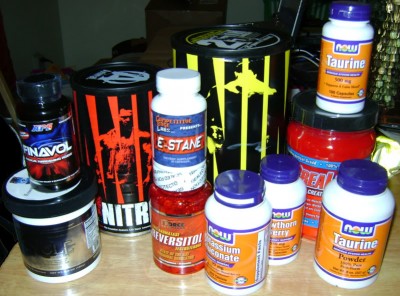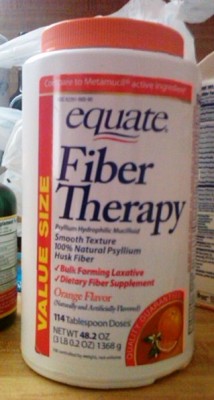The term “stack” has its origins in Old Norse as having to do with haystacks. Shortly around this time, men were noted to say, “Aye, that women be stacked to the brim,” since a particularly well endowed female trait made the appearance of two neatly placed haystacks. That last sentence wasn’t actually true. For whatever reason, the term “stack” was associated with a nutritional (natural or otherwise) supplement to one’s training. I don’t know if it originated in bodybuilding, Olympic lifting, or power lifting, and to be honest, I don’t really give a poo. These days it seems to have a bodybuilding connotation, which is usually comically unnecessary. Modern bodybuilding literature (propaganda?) is infamous for its ridiculous products with promised results. Thus, in certain groups, “stack’ may have a negative connotation.
That is, until Brent Kim decided to be a pain in the ass.

Typical waste of money stack
There are some essential items that a lifter should, in essence, stack onto their training. It is important to note that the value of these items is reduced to precisely “dick” if you aren’t eating appropriate amounts of protein and calories in order to recover and improve. But, for the sake of this post, we are going to assume you have this under control (Guideline: 1g of protein per lb of bodyweight, and if you aren’t recovering, then you aren’t getting enough calories).
It wasn’t too long ago that Brent’s training stack was a healthy dose of kimchee and bulgogie (Korean barbecue, which is top notch). Then there came a time when Brent duly noted the fish oil intake that I adhered to. The following conversation ensued:
Brent: How much should I take?
Me: Well, I take about 14g, so you should probably take 8 to 10
Brent: I’m going to take 28 grams because I am twice the man you are.
And thus Brent started thinking about his stack. Thinking led to reading, reading let to more thought, and then, Brent wanted to know what everyone else’s stack was. Relentlessly.
“Hey man, what’s your stack?” was asked both in a serious and comical manner. Serious, for he really did want to know, and comical because the usage of the term “stack” is previously associated with the bodybuilding silliness described above. When Brent first started saying it, it was embarrassing, because anybody who heard might think he was serious about the term. The problem was that he was serious, but now it’s okay because he/we have changed the term into its new accepted usage and meaning (which generally gets out of hand with my group of friends).
In any case, your stack is something that is “stacked onto” your training program and your food intake. If your food intake isn’t appropriate for your goals, then you don’t have any business worrying about your stack. If you don’t even know how you should be eating to accomplish your goals, then you have some research to do, and still don’t need to worry about your stack. Even if you did have all of those things taken care of, a lifter doesn’t need much in his stack to reap the supplemental rewards. Here are some essentials.
Note: As always, consult your physician about any of this stuff. If you take any of this stuff because you read about it here, you do so at your own risk. If you are unsure about any of it, then don’t take it.
Whey Protein
This may not even be considered part of a stack because it might be a staple to your diet. In any case, it’s supplemental to food, so I’ll include it here. If you aren’t getting your allotted protein intake, then nothing else really matters. Sometimes you’re in a pinch and can’t eat all of it in the source of meat, so whey protein is a nice, quick replacement. You don’t need to buy anything expensive, because all the brands will do the same thing anyway. Most brands are outfitted with BCAA’s, and generally the more money you spend, the better it tastes. However, if they make claims on the absorption rate or any of that other bullshit, just ignore it. It’s useless, and we are worried about the chronic intake of protein anyway. My buddy Mike likes the Optimum Nutrition brand because their protein is tasty, and they have lots of flavors. You can also get the EAS brand at Sam’s Club for pretty cheap.
Multi-Vitamin
Vitamins and minerals are vital to a healthy, functioning body. Sometimes our diet doesn’t include all of the goodies that we may need. Even if you are eating plenty of Paleo-esque meats, fats, vegetables, and fruits, you may accidentally neglect something. In such a case, having a decent multivitamin can pick up the slack. If you are training hard then you’ll need more vitamins anyway, and if you’re eating to gain mass you’ll be purposely neglecting some healthy foods. Cover your bases with a generic brand multi-vitamin — you don’t have to spend lots of money on it. Bill Starr always recommended the shovel technique to get more than you’ll actually need. This is fine with water soluble vitamins (Vitamins C and B-vitamins) because you’ll just pee the excess out, but keep an eye on some brands that have crazy amounts of fat soluble vitamins like A, K, D, and E. I’m not saying shy away from them (especially because we’ll need more of most stuff when we’re training hard), but you won‘t need ridiculous amounts. Lastly, make sure your multi-vitamin is equipped with magnesium and zinc.
Fish Oil
I haven’t done a literature review on fish oil, but I’ve seen some of the research. In any case, lots of people who are “in the know” regarding nutrition recommend fish oil for its anti-inflammatory properties, it’s improvement on blood lipid profiles, and its apparent ability to lower the chance of certain diseases, conditions, and cancers. As a lifter, you want it for the anti-inflammatory properties, because when you lift hard, you get lots of inflammation. Following that logic, it is something that has the potential to help with recovery, and that’s what we want. To get an idea of how much you should take, here is a fish oil calculator that my friend Melissa Urban created for Robb Wolf’s blog.
Creatine
“Creatine is one of the only supplements that does what it actually says it is going to do.” — paraphrased from conversations with Dr. Kilgore. As a clunky summary, it helps the phosphocreatine system reproduce ATP faster, and this helps in the recovery from short, intense bursts of work (like what happens in lifting). There has been talk on the internet of “non-responders”, but the real problem is getting it to absorb correctly (there are quite a few factors that can limit absorption). Dr. Kilgore once told me that mixing the monohydrate in chocolate milk is a fantastic way to help it absorb (the lipids and sugars each play their part — look up how these things are digested for clarification). The general consensus for ingesting creatine monohydrate is to load for 5 days at 0.3g/kg of bodyweight, and then maintain at .03g/kg bodyweight.
There is a new product called creatine ethyl ester which gets converted into creatine within the body. The draw is that it apparently absorbs better, but it’s more expensive, and I don’t have time for ‘more expensive’.
Fiber
When eating to increase or maintain mass, vegetables may get ignored. In such a case, you are gonna want to eat some fiber. I’ve written about it before here: http://www.70sbig.com/?p=1041
Intestinal benefits aside, it will make your bathroom time more enjoyable, especially if you’re drinking a gallon of milk.
Glucosamine and Chondroitin Sulfate
This stuff is supposed to help with joint health. Hell, I don’t know if it works. Some people swear by it and some people swear at it. I figured that since I want to lift throughout my entire life, and since I’m doing a lot of jumping around in the Olympic lifts, I my as well try it. I wouldn’t say I had sore knees, but I could feel them after some rough Oly workouts, sometimes the next day. I got a cheap pair of cloth knee sleeves and started taking glucosamine/chondroitin, and I haven’t noticed it anymore. Lots of factors go into this, but if you’re willing to try anything…
Again, I want to reiterate that none of this really matters if you aren’t eating well. Tons of people will have opinions on nutritional supplementation and most will get weirdly complicated. I’m not really into that; I just get a few things to try and maximize my recovery without spending a whole lot of money. I’m sure most of you will have some kind of comment today. Realistically, the only person you should listen to is Gant, because most of you don’t know why the hell you’re taking something.

